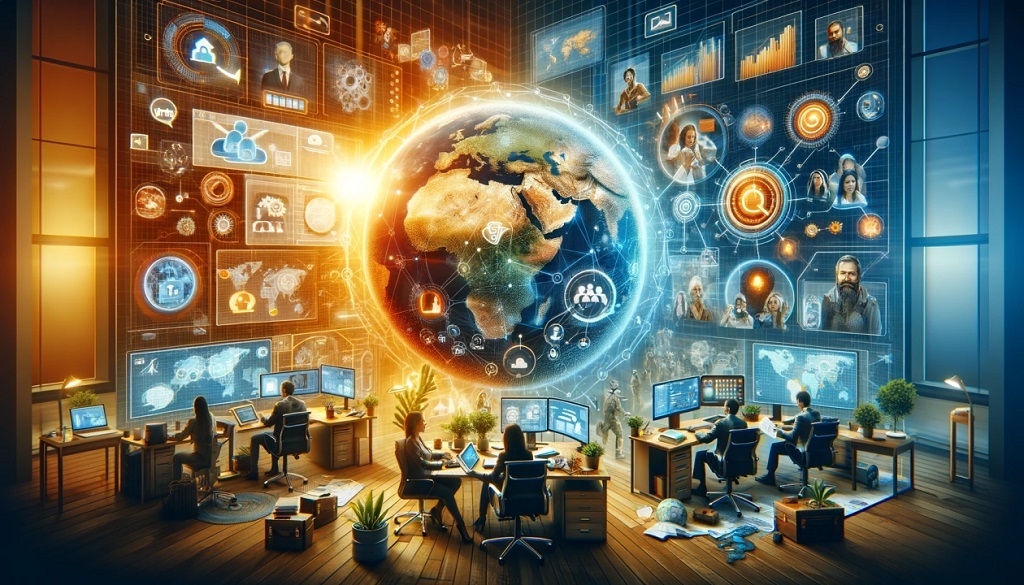The digital era is shaping our world with every passing day. From social media platforms like Facebook and Twitter to payment methods like debit and credit cards, digitalization has permeated our daily lives. In a world where technology is constantly evolving, human beings are constantly adapting. The future of humanity in the age of digitalization is looking brighter every day.
Artificial intelligence (AI), for instance, is expected to change the way we work and communicate with each other. As AI becomes smarter, it will be able to perform functions that no human being could do before. It will be able to think faster and make decisions for us. Some people may fear its introduction into the world because of how it can affect jobs and industries. Fortunately, there are also people who embrace this change enthusiastically as a new era of automation begins to take shape. This blog goes over social implications of digital transformation, exploring the future of humanity in the age of digitalization and its social implications.
What are the social implications of digital transformation?

Digitalization is a global phenomenon, which is reshaping the world as we know it. This revolution brings with it a host of benefits, but also carries a number of social implications.
In the age of digital transformation, many new technologies are shaping our lives in an unprecedented manner. The internet of things and artificial intelligence are two technologies that have the potential to change the way we live.
As digitalization progresses, we will witness a shift from isolated to interconnected world. With increased access to technology, there is a possibility of greater economic equality among countries and individuals. Additionally, digitalization could lead to increased social inclusion and civic engagement. However, there are some concerns too. In terms of privacy and anonymity, it has been argued that the digital world poses a serious threat. Currently, data on our personal lives is being collected by various tech giants indiscriminately without our consent or knowledge. This can create a sense of surveillance, which can be detrimental for our well-being. Moreover, there are some concerns about digital transformation leading to cultural diversity loss and lack of creativity in society due to increasing automation in various fields such as music and art.
How digital transformation is impacting humanity?
Digital transformation is a rapidly evolving technology-led trend that is changing the way we live, work, and play. This digital age has seen a marked rise in digital technologies, and it is no longer realistic to ignore its impact on human societies. While it has created many opportunities, digital transformation also poses a significant challenge to humanity as data becomes increasingly valuable and digitization of processes increases. With rapid technological advancements like artificial intelligence (AI), machine learning, and IoT, humanity is facing new challenges of data management and privacy. We need to develop a better understanding of social implications of digital transformation in order to pave the way for its positive impact on humanity.
How can we address the social implications of digital transformation?
The social implications of digital transformation are complex, wide-reaching and far-reaching. The digital age is creating a new world order where new technologies are shaping human societies in various ways. In this age of digitalization, there’s a growing need for collaborations among different sectors to address the social implications of digital transformation.
The social implications of digitalization cannot be ignored, as it has a direct bearing on our day-to-day lives. It is important to understand the needs and expectations of citizens as well as businesses and governments. This will help formulate a policy framework that addresses digitalization with a holistic approach.<EOS>
Also, new models of governance and management are needed to ensure that digitalization can bring the desired benefits to everyone.
Social implications of artificial intelligence and cognitive technology
The social implications of artificial intelligence and cognitive technologies are far-reaching and complex. As AI and cognitive technologies become more advanced, they will have a significant impact on human society and the economy. The current pace of machine learning is unprecedented, and no one can predict the future of this new technology with certainty. This makes it vital for governments, societies, and individuals to come together to discuss ethical and social implications of this technology.
There are so many questions about how these technologies should be used and who should control them. There’s a need for guidelines for how these technologies should be used, and how they should be regulated. Besides, there are concerns about the potential for misuse of these technologies, including for military purposes. As we know too well that many of us fall victim to internet-based fraudsters every day. We must ensure that artificial intelligence is a boon to humanity rather than a threat.
The future of humanity in the era of digital transformation
The digital transformation is altering the way we live, work, and play. It is also ushering in a new era of human development. As more people join digital age, it alters their views on privacy and data ownership. It also creates a new age of healthcare by digitizing processes like prescription-writing and medical record-keeping.
As more people use digital technologies, their socialization patterns change too. Younger generations are more likely to connect digitally than older generations. The future of humanity is bound to be shaped by the growth of digital technologies. In short, the digital transformation is a game-changer for humanity and could bring about a new era of human development.
Strategy
Digital transformation has the potential to benefit humanity in a number of ways. It can help to improve efficiency and productivity, reduce costs, and increase access to information. However, digital transformation also carries a range of risks, such as cyberattacks and data breaches.
The successful implementation of digital transformation requires careful planning and a strong commitment from all stakeholders. In order to ensure that digital transformation leads to improved human welfare, it is vital that organizations understand the benefits and challenges of digital transformation, as well as the business goals they are trying to achieve with it.
Operations
Digital transformation is changing the way we work and live, and it has far-ranging social implications. The future of humanity will be shaped by how we manage operations in the era of digital transformation. This presentation explores some of the key issues involved in digital transformation and its impact on operations. It provides an overview of how digital technologies are changing the way we work and interact with each other, and offers strategies for effectively incorporating these changes into your business operations. In order to stay competitive in a digital world, organizations must constantly evaluate their current processes, technologies, and organizational models to ensure they remain up-to-date and remain relevant to their customers.
Technology
The era of digital transformation is already having a significant impact on the way we think about the future. The workshop aim to explore the social implications of this rapid technological change, and participants will develop a better understanding of how technology is shaping society and its inhabitants. By exploring the social consequences of digital transformation, attendees will be able to make informed decisions about which technologies to adopt and how to best use them in their daily lives.
By attending this workshop, participants will learn how digital technologies are changing the way we live and interact with one another, as well as how we perceive our identity in a rapidly evolving world. Overall, this workshop aims to explore the ways in which technology has transformed our society and what it means for future generations.
Conclusion
Digital transformation is a social revolution and we must embrace it. Our digital technologies are changing the way we think and interact with the world around us. We are using digital technologies to create a more efficient, automated, and connected society. This technological change has a profound impact on our lives, societies, and economies—from a range of social consequences ranging from job automation to declining wages to rising inequality. Many of these effects are not yet clear or certain but they are real and can be expected over time. If we want to prepare for them and maximize the positive impacts of digital transformation, it is vital that we understand digital transformation as a social phenomenon and act accordingly. With this understanding, we will be better-positioned to harness digital technologies for positive change and achieve a better future for humanity as a whole.





